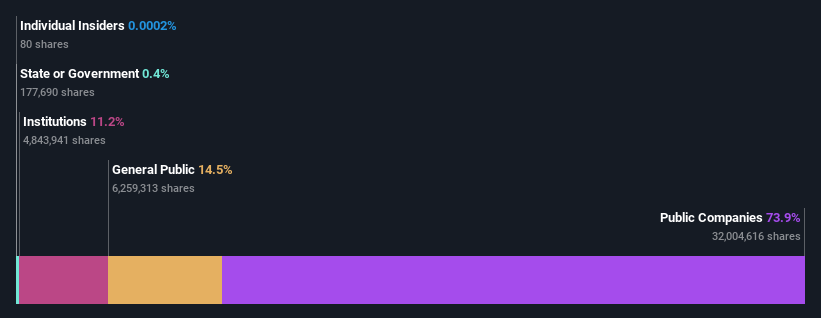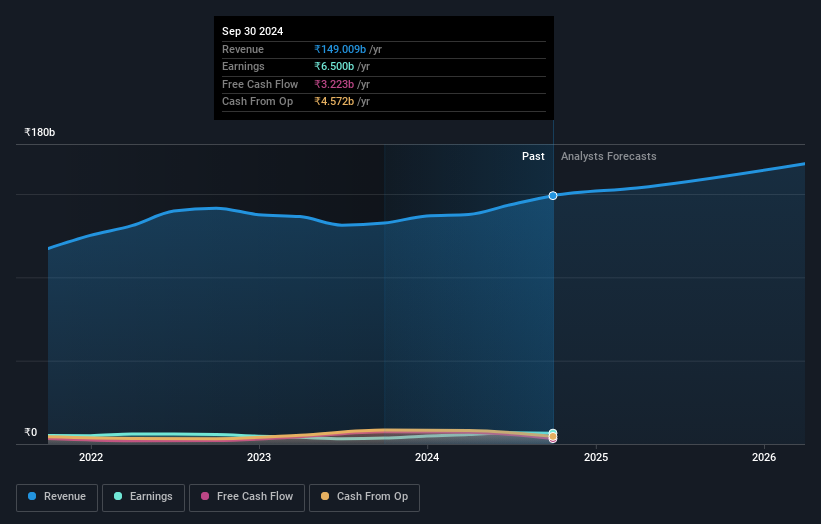BASF India Limited's (NSE:BASF) stock price dropped 3.8% last week; public companies would not be happy

Key Insights
- Significant control over BASF India by public companies implies that the general public has more power to influence management and governance-related decisions
- The largest shareholder of the company is BASF SE with a 73% stake
- Institutions own 11% of BASF India
A look at the shareholders of BASF India Limited (NSE:BASF) can tell us which group is most powerful. The group holding the most number of shares in the company, around 74% to be precise, is public companies. Put another way, the group faces the maximum upside potential (or downside risk).
And following last week's 3.8% decline in share price, public companies suffered the most losses.
Let's take a closer look to see what the different types of shareholders can tell us about BASF India.
View our latest analysis for BASF India

What Does The Institutional Ownership Tell Us About BASF India?
Institutions typically measure themselves against a benchmark when reporting to their own investors, so they often become more enthusiastic about a stock once it's included in a major index. We would expect most companies to have some institutions on the register, especially if they are growing.
We can see that BASF India does have institutional investors; and they hold a good portion of the company's stock. This can indicate that the company has a certain degree of credibility in the investment community. However, it is best to be wary of relying on the supposed validation that comes with institutional investors. They too, get it wrong sometimes. If multiple institutions change their view on a stock at the same time, you could see the share price drop fast. It's therefore worth looking at BASF India's earnings history below. Of course, the future is what really matters.

BASF India is not owned by hedge funds. BASF SE is currently the largest shareholder, with 73% of shares outstanding. This essentially means that they have extensive influence, if not outright control, over the future of the corporation. With 3.5% and 2.1% of the shares outstanding respectively, Tata Asset Management Limited and Plutus Wealth Management LLP are the second and third largest shareholders.
While it makes sense to study institutional ownership data for a company, it also makes sense to study analyst sentiments to know which way the wind is blowing. There is a little analyst coverage of the stock, but not much. So there is room for it to gain more coverage.
Insider Ownership Of BASF India
While the precise definition of an insider can be subjective, almost everyone considers board members to be insiders. Company management run the business, but the CEO will answer to the board, even if he or she is a member of it.
Most consider insider ownership a positive because it can indicate the board is well aligned with other shareholders. However, on some occasions too much power is concentrated within this group.
Our information suggests that BASF India Limited insiders own under 1% of the company. Keep in mind that it's a big company, and the insiders own ₹357k worth of shares. The absolute value might be more important than the proportional share. It is good to see board members owning shares, but it might be worth checking if those insiders have been buying.
General Public Ownership
The general public, who are usually individual investors, hold a 14% stake in BASF India. While this group can't necessarily call the shots, it can certainly have a real influence on how the company is run.
Public Company Ownership
We can see that public companies hold 74% of the BASF India shares on issue. It's hard to say for sure but this suggests they have entwined business interests. This might be a strategic stake, so it's worth watching this space for changes in ownership.
Next Steps:
While it is well worth considering the different groups that own a company, there are other factors that are even more important. Take risks for example - BASF India has 1 warning sign we think you should be aware of.
But ultimately it is the future, not the past, that will determine how well the owners of this business will do. Therefore we think it advisable to take a look at this free report showing whether analysts are predicting a brighter future.
NB: Figures in this article are calculated using data from the last twelve months, which refer to the 12-month period ending on the last date of the month the financial statement is dated. This may not be consistent with full year annual report figures.
Valuation is complex, but we're here to simplify it.
Discover if BASF India might be undervalued or overvalued with our detailed analysis, featuring fair value estimates, potential risks, dividends, insider trades, and its financial condition.
Access Free AnalysisHave feedback on this article? Concerned about the content? Get in touch with us directly. Alternatively, email editorial-team (at) simplywallst.com.
This article by Simply Wall St is general in nature. We provide commentary based on historical data and analyst forecasts only using an unbiased methodology and our articles are not intended to be financial advice. It does not constitute a recommendation to buy or sell any stock, and does not take account of your objectives, or your financial situation. We aim to bring you long-term focused analysis driven by fundamental data. Note that our analysis may not factor in the latest price-sensitive company announcements or qualitative material. Simply Wall St has no position in any stocks mentioned.
About NSEI:BASF
BASF India
Provides chemicals, materials, industrial solutions, surface technologies, nutrition and care, and agricultural solutions in India.
Flawless balance sheet with solid track record and pays a dividend.
Market Insights
Community Narratives


